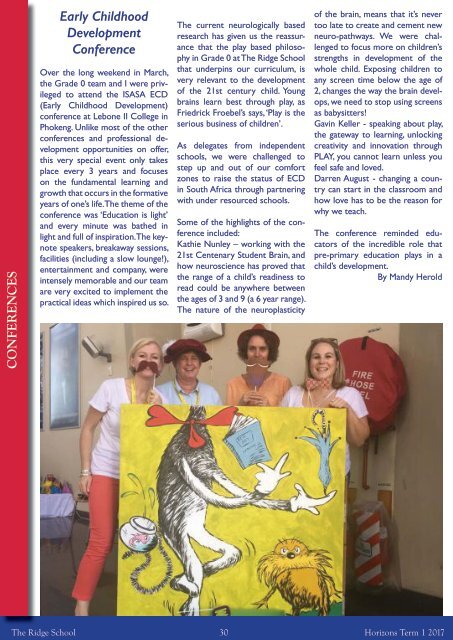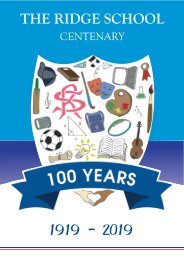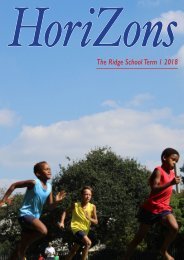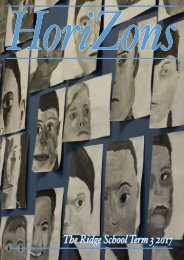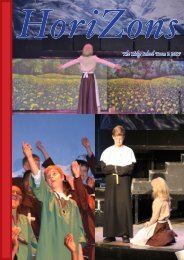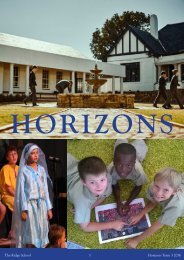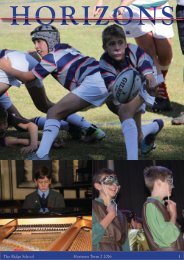HORIZONS TERM 1 2017
The Ridge School Termly Newsletter
The Ridge School Termly Newsletter
You also want an ePaper? Increase the reach of your titles
YUMPU automatically turns print PDFs into web optimized ePapers that Google loves.
CONFERENCES<br />
Early Childhood<br />
Development<br />
Conference<br />
Over the long weekend in March,<br />
the Grade 0 team and I were privileged<br />
to attend the ISASA ECD<br />
(Early Childhood Development)<br />
conference at Lebone II College in<br />
Phokeng. Unlike most of the other<br />
conferences and professional development<br />
opportunities on offer,<br />
this very special event only takes<br />
place every 3 years and focuses<br />
on the fundamental learning and<br />
growth that occurs in the formative<br />
years of one’s life. The theme of the<br />
conference was ‘Education is light’<br />
and every minute was bathed in<br />
light and full of inspiration. The keynote<br />
speakers, breakaway sessions,<br />
facilities (including a slow lounge!),<br />
entertainment and company, were<br />
intensely memorable and our team<br />
are very excited to implement the<br />
practical ideas which inspired us so.<br />
The current neurologically based<br />
research has given us the reassurance<br />
that the play based philosophy<br />
in Grade 0 at The Ridge School<br />
that underpins our curriculum, is<br />
very relevant to the development<br />
of the 21st century child. Young<br />
brains learn best through play, as<br />
Friedrick Froebel’s says, ‘Play is the<br />
serious business of children’.<br />
As delegates from independent<br />
schools, we were challenged to<br />
step up and out of our comfort<br />
zones to raise the status of ECD<br />
in South Africa through partnering<br />
with under resourced schools.<br />
Some of the highlights of the conference<br />
included:<br />
Kathie Nunley – working with the<br />
21st Centenary Student Brain, and<br />
how neuroscience has proved that<br />
the range of a child’s readiness to<br />
read could be anywhere between<br />
the ages of 3 and 9 (a 6 year range).<br />
The nature of the neuroplasticity<br />
of the brain, means that it’s never<br />
too late to create and cement new<br />
neuro-pathways. We were challenged<br />
to focus more on children’s<br />
strengths in development of the<br />
whole child. Exposing children to<br />
any screen time below the age of<br />
2, changes the way the brain develops,<br />
we need to stop using screens<br />
as babysitters!<br />
Gavin Keller - speaking about play,<br />
the gateway to learning, unlocking<br />
creativity and innovation through<br />
PLAY, you cannot learn unless you<br />
feel safe and loved.<br />
Darren August - changing a country<br />
can start in the classroom and<br />
how love has to be the reason for<br />
why we teach.<br />
The conference reminded educators<br />
of the incredible role that<br />
pre-primary education plays in a<br />
child’s development.<br />
By Mandy Herold<br />
The Ridge School 30 Horizons Term 1 <strong>2017</strong>


